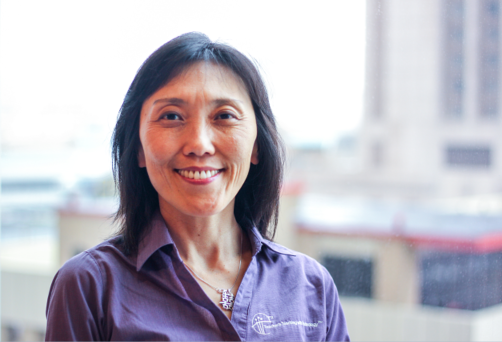Meet TI Teacher of the Month: Alice Fisher

We’re celebrating teachers, like you, who make a difference in the classroom. This month, join us in getting to know Alice Fisher, an AP computer science teacher from Houston, who collaborates with professors from Rice University to integrate art into coding.
Fast Facts About Alice:- TEACHES WHAT: AP Computer Science and AP Computer Science Principles, 9th-12th grade
- TEACHES WHERE: Bellaire High School, Houston, Texas
- TEACHING FOR HOW LONG: 13 years
Why did you become a teacher?
I’ve always liked the idea of helping others. Initially, I choose a pre-med path in college, but while in college I realized that I really enjoyed helping my friends with math homework. During this time, I decided teaching was more fulfilling to me, than the idea of going to med school. Teachers have such a lasting impact through the relationship with their students.
What advice would you give to your first-year teaching self?
Don't be so hard on yourself. Even if you make mistakes, which I still do, be forgiving of yourself and then be transparent with your students so that you are a role model for them.
"The other thing I would say is, don’t give meaningless homework – give meaningful problems."
Alice Fisher, TI Teacher of the Month
Why do you enjoy teaching computer science?
Computer science is a way that I'm able to be creative. For example, I’ve been working with educators at Rice University on a project that integrates culturally relevant art into python in a Geometry class, which is such a neat way to integrate art with coding and math.
What is your primary goal for your students this year?
The obvious one is that I want them to pass the AP exam and get college credit. More importantly, I want my students to have the ability to solve problems in more than one way. I want to shift my students’ focus from being concerned with figuring out an answer, to thinking about different ways they can solve a problem. To me, what’s most important is being flexible in your thinking.
How do you help your students learn difficult concepts?
One of the best things I’ve heard is that if you're teaching something hard that you let it go a little bit, but then you come back to it. From there, you start adding that concept back into your lesson plans. Not just that week, but over multiple weeks so that students can start getting a better understanding.
Any other words of wisdom for other teachers?
I think that you have to be excited about learning, yourself. It’s important to be humble and always open to learning how to do something even better. You should always be seeking out, improving your craft. Something I appreciate about the Teachers Teaching with Technology (T3) community is there is a wide representation of generations who find value in professional development. People are seeking out professional development not just in their twenties, but in their sixties and beyond. And I think that's amazing.
Tagcloud
Archive
- 2025
- 2024
- 2023
- 2022
-
2021
- January (2)
- February (3)
- March (5)
-
April (7)
- Top Tips for Tackling the SAT® with the TI-84 Plus CE
- Monday Night Calculus With Steve Kokoska and Tom Dick
- Which TI Calculator for the SAT® and Why?
- Top Tips From a Math Teacher for Taking the Online AP® Exam
- Celebrate National Robotics Week With Supervised Teardowns
- How To Use the TI-84 Plus Family of Graphing Calculators To Succeed on the ACT®
- AP® Statistics: 6 Math Functions You Must Know for the TI-84 Plus
- May (1)
- June (3)
- July (2)
- August (5)
- September (2)
-
October (4)
- Transformation Graphing — the Families of Functions Modular Video Series to the Rescue!
- Top 3 Halloween-Themed Classroom Activities
- In Honor of National Chemistry Week, 5 “Organic” Ways to Incorporate TI Technology Into Chemistry Class
- 5 Spook-tacular Ways to Bring the Halloween “Spirits” Into Your Classroom
- November (4)
- December (1)
-
2020
- January (2)
- February (1)
- March (3)
- April (1)
- May (2)
- July (1)
- August (2)
- September (3)
-
October (7)
- Tips for Teachers in the time of COVID-19
- Top 10 Features of TI-84 Plus for Taking the ACT®
- TI Codes Contest Winners Revealed
- Best of Chemistry Activities for the Fall Semester
- Best of Biology Activities for the Fall Semester
- Best of Physics Activities for the Fall Semester
- Best of Middle Grades Science Activities
- November (1)
- December (2)
- 2019
-
2018
- January (1)
- February (5)
- March (4)
- April (5)
- May (4)
- June (4)
- July (4)
- August (4)
- September (5)
-
October (9)
- Art in Chemistry
- Which Texas Instruments (TI) Calculator for the ACT® and Why?
- Meet TI Teacher of the Month: Jessica Kohout
- Innovation in Biology
- Learning With Your Students
- A first-of-its-kind STEM strategy charts path to help educators
- #NCTMregionals Hartford 2018 Recap
- The Math Behind “Going Viral”
- Real-World Applications of Chemistry
-
November (8)
- Testing Tips: Using Calculators on Class Assessments
- Girls in STEM: A Personal Perspective
- 5 Teachers You Should Be Following on Instagram Right Now
- Meet TI Teacher of the Month: Katie England
- End-of-Marking Period Feedback Is a Two-Way Street
- #NCTMregionals Kansas City 2018 Recap
- Slope: It Shouldn’t Just Be a Formula
- Hit a high note exploring the math behind music
- December (5)
- 2017
- 2016
- 2015
